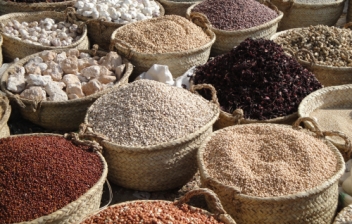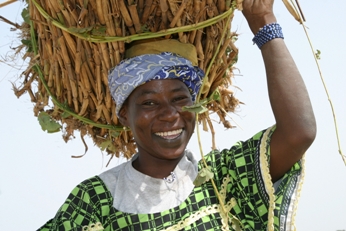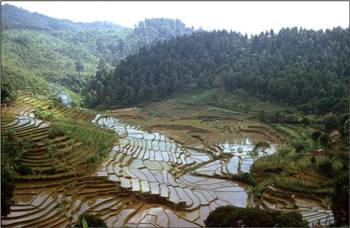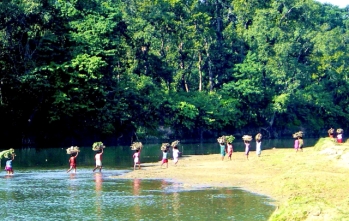





The aim of this study is to estimate the potential for generating carbon credits from Reducing Emissions from Deforestation and Degradation (REDD) in a region known as the Southern Cardamoms Ecosystem, Southwest Cambodia. Through the last decade, the Southern Cardamom Ecosystem has seen increasing pressures on its forest resources. The Royal Government of Cambodia sought the assistance of the NGO Wildlife Alliance to control degrading forest activities in the area in 2002. The study investigated whether multiple goals could be achieved at the same time, including the conservation of the forest, reduction of CO2 emissions, support and development of local communities, and the generation of revenues for the Cambodian Government and the NGO.
Despite a low deforestation rate during the last decade, the forest ecosystem of Aceh Province (north Sumatrea, Indonesia) has come under renewed pressure brought about by an array of socio-political and economic changes. The objective of this study was to quantify the economic importance of the forest ecosystem in the province of Aceh by evaluating the (changes in) economic benefits associated with two contrasting scenarios, viz. deforestation and forest conservation.
This study explores the economic compensation needed by local communities in Central Kalimantan to cooperate in peatland restoration programmes using a Choice Experiment combined with a series of Focus Group Discussions. The study concluded that many local farmers find it difficult to make a living from the infertile peatlands (which are not very suitable for agriculture). As such, they are willing to switch to more sustainable practices such as reforesting part of their land, but only under certain conditions. The study offers a number of recommendations to make peatland conservation measures more effective, including the need to create more awareness among local communities about the benefits of peatland conservation; the need to create a system of secure tenure rights and so reduce the risk of food and income shortages; and opportunities for setting up compensation schemes in return for farmer cooperation.
This study examines to what extent global payments for ecological services rendered by the Amazon Region, such as the carbon retained by its forests, could help to preserve the forest. The work aims to show that the currently received revenues from economic activities that leave the natural environment intact are not high enough to compete with non-sustainable activities. Finding mechanisms to secure global payments for the forest's currently unpaid ecological services would be a major impetus towards both preserving the forest and paying / providing for proper management.
This project aims at understanding the drivers of changes in land use systems and their implications for sustainable management in the Kafa Biophere Reserve, SW Ethiopia. Social and physical drivers of forest conversion and the role of large-scale coffee cultivation in the area are investigated as well as alternative land use systems in terms of their tree diversity, carbon storage, and other ecosystem services. The options of certification of coffee products and eco-tourism as drivers of alternative land management practices are explored as well.
This ERC research project aims at novel ways of land use change modelling that account for the different decision making processes involved with land use change.
The project will look at the way in which heterogeneity in decision making affects land use change patterns, but also investigates how changes in the physical environment, including land degradation and climate change, affect this decision making process.
While having a global focus, in-depth studies will take place in multiple global regions.
This FP7 EC research project (2011-2014) focuses on continued use of water harvesting technologies by smallholder farmers in semi-arid Africa.
Investments in water harvesting are well-known measures for improving agricultural productivity and reducing land degradation.
Technical studies indicate that benefits exceed the costs of investments, but in practice spontaneous uptake of water harvesting is limited and externally financed water harvesting structures are often not maintained.
This is a problem, since with a changing climate and increasing populations the efficient use of scarce land and water resources is essential to secure food production and sustain livelihoods in semi-arid climates.
The project assesses the technical, socio-economic and institutional factors limiting uptake of water harvesting technologies and assesses the environmental sustainability and potential for upscaling of water harvesting technologies in Africa through empirical analysis, modelling and case study work.
Restoring rivers for effective catchment management (REFORM, 2011-2014) – EU 7th framework, Integrated Programme with 25 partners, IVM-Vermaat lead partner for ecosystem services assessment comparing restored and unrestored river corridors in Europe and coupling biophysical fluxes and economic valuation techniques.
Science and Policy Integration for Coastal System Assessment (SPICOSA, 2007-2010) – EU 6th Framework Integrated Programme, Vermaat acted as coordinator of IVM's contribution to various Work Packages and lead author of the Scheldt case study that quantified catchment nitrogen fluxes in relation to land use, modelling spatio-temporal variations in streamflow and nitrogen loads associated with various land use policy options and long-term scenarios.
Back to the ACRES_R3 main page